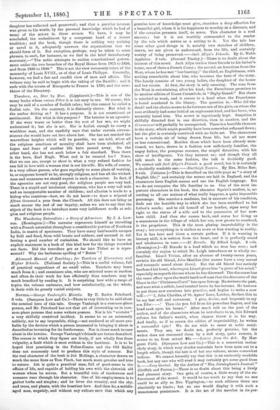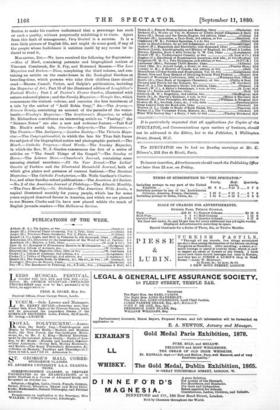NOVELS.— George Vanbrugh's Mistake. By H. Baden Pritchard. 3 vols. (Sampson
Low and Co.)—There is very little to be said about the nominal hero of this tale. George Vanbrugh is a common-place person, and Mr. Pritchard has not that art of interesting us in com- mon-place persons that some writers possess. Nor is his " mistake " a very skilfully contrived incident. It seems to us an extremely unlikely, not to say impossible, thing,—not rendered at all more pro. bable by the devices which a person interested in bringing it about is described as inventing for its furtherance. Nor is there much to care about in the heroine. George Vanbrugh's friends are better described. The scenes in which they figure are lively, if not wholly free from vulgarity, a fault which is most evident in the barrister. It is to be hoped that practising in the Police-Courts and the Old Bailey does not commonly tend to produce this style of manner. But the real character of the book is Job Hollings, a character drawn on much the same lines as Tom Pinch, but much more genuine and true to nature. Job is quite a practical man, full of good-sense in the affairs of life, and capable of holding his own with the shrewish old woman whom he serves. But a beautiful vein of tenderness and romance runs through his character. One of his employments is to gather herbs and simples ; and he loves the country, and the sky, and trees, and plants, with the heartiest love. And then he, a middle- aged man, ungainly, and without any culture save thAt which any genuine love of knowledge mast give, cherishes a deep affection for a beautiful girl, whom it is his happiness to worship at a distance, and if the occasion presents itself, to serve. This character is a real success ; but it is not worthily commended to the reader by the tale which serves as a setting to it. Yet the tale has some other good things in it, notably two sketches of children, drawn, we are given to understand, from the life, and certainly worthy of being preserved.—.Tack Allyn's Friends. By G. Webb Appleton. 3 vols. (Samuel Tinsley.)—There is no doubt about the interest of this novel. Jack Allyn invites three friends to his father's house, one of them a French Count ; the second, an American from the West, whom ho has met " bar-hunting ;" the third, an Englishman, with nothing remarkable about him, who becomes the hero of the story. The family consists of two young ladies, the daughter of the house and her cousin. At first, the story is only amusing. The man from the West is entertaining, after his kind; the Frenchman promises to be another edition of Count Carambole, in "Digby Grand." But there is mischief at work, and it conies to a head when the Frenchman is found murdered in the library. The question is,—Who did the deed ? and the choice seems to lie between one of the girls, on whom the man evidently had some hold of an unpleasant kind, and her lover, who naturally bated him. The secret is ingeniously kept. Suspicion is skilfully directed first in one direction, then in another, and the denouement will probably be unsuspected. There is a horrible element in the story, which might possibly have been somewhat softened down; but the plot is certainly contrived with no little art. The characters have a certain air of being drawn from life, but all are more or less conventional. Besides those which have been already men- tioned, we have, drawn in a fashion now sufficiently familiar, the angry father, the pompous coroner, the stupid detective, with his show of intelligence. Yet they interest us ; and though they all talk much in the same fashion, the talk is decidedly good. We cannot call Jack Allyn's Friends a good novel, but it is certainly a decidedly readable one.—Hartleigh Towers. By Mrs. Milne Rae. 3 vols. (Isbister.)—This is described on the title-page as " a story of English life ;" and certainly the scenes are laid in England, and the characters have English names and use the English language. But we do not recognise the life familiar to us. One of the most im- portant characters in the book, the absentee Squire's mother, is, ac- cording to all our notions of what really happens, a quite impossible personage. She marries a madman, but is unaware of his condition, finds out the horrible way in which she has been sacrificed to her father's needs; and to rid herself of her burden, signs away her right to the status of a wife and to the possession of her new- born child. And then she comes back, and earns her living as a seamstress in the village of which her son, now grown to manhood, is the proprietor. This is the most glaring improbability in the story ; but everything in it strikes as more or less wanting in reality. Yet it has here and there a certain pathos. If it is wanting in literary skill, it is written from the heart, and it is perfectly sound and wholesome in tone.—El Dorado. By Alfred Leigh. 2 vols. (Remington.)—El Dorado is a land which no man has seen ; and certainly the region to which Mr. Leigh introduces as is wholly un- familiar. Lionel Vivian, after an absence of twenty-seven years, revisits his old friend, John Olaridas (the names have a very unreal and romantic sound about them). But the old friend has entirely hardened his heart, whereupon Lionel gives him "a piece of his mind," especially as regards the son whom be has disowned. The discourse has the same effect upon the world-hardened man that the discourse of the Ghost in the "Christmas Carol" has upon Scroop. He reviews the past, and sees what a selfish, hard-hearted brute he has become. Ho hastens to put these new emotions into practice, and begins to write a new will :—" I, John Claridas, of St. Agnes' Lane, London, declare this to be my last will and testament. I give, devise, and bequeath to my son Edw—.' Then the pen fell from his powerless fingers, and his bead sank upon his breast." After much talk on the part of the author, and of the characters whom he introduces to us, this Edward refuses his father's wealth, when chance threw it in his way. And finally, as if to crown the edifice of improbability, he writes a successful epic ! We do not wish to sneer at noble senti- ments. They are, we doubt not, perfectly genuine, but the writer does not commend them by a dull story, quite remote, it seems to us, from actual fife.—Leares from the Ash. By Mar- garet Field. (Sampson Low and Co.)—This is a somewhat melan- choly story, in which very slender materials have been spun out to a length which, though the tale is of but one volume, seems somewhat tedious. We cannot honestly say that this is an eminently readable book, but any one who will read it may certainly get some good from it.—Very Genteel. By the Author of "Mrs. Jerningbam's Journal." (Griffith and Farran.)—There is no doubt about this being a lively and pleasant story. One gets, of course, a little weary of the en- forcement of the moral. It would be too much to say that no one could be so silly as Mrs. Tippiogton,—to such silliness there are absolutely no limits ; but no one would display it with such a monotonous persistence. It is the art of the novelist in its per- fection to make big readers understand that a personage has such or such a quality, without perpetually exhibiting it to them. Apart from this fault of management, Very Genteel is a success. It is a true little picture of English life, and might do some good, if any of the people whose foolishness it satirises could by any means be in- duced to road it.



































 Previous page
Previous page